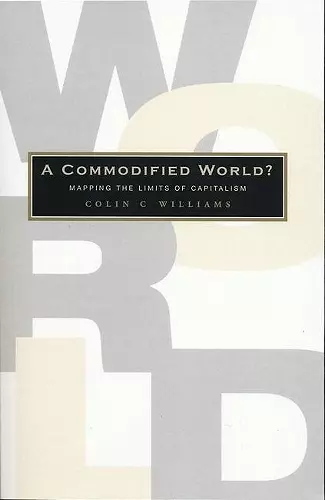A Commodified World
Mapping the Limits of Capitalism
Format:Paperback
Publisher:Bloomsbury Publishing PLC
Published:4th Mar '05
Currently unavailable, and unfortunately no date known when it will be back

Provides a critique of the assumption of increasing commodification in the modern economy.
A Commodified World critiques the notion that in Late Capitalism all economic relations become always ever more commodified, while ‘non-capitalist‘ activities disappear. It demonstrates that a combination of new 'cultures of resistance' all constrain this tendency or even threaten to reverse it. Colin Williams finds that, even in the advanced economies, a non-commodified realm persists that is as large as the commodified sphere and growing relative to it. He draws on extensive empirical evidence of trends and new patterns of economic activity – including changes in women's participation, differences between wealthy and poor urban areas, and between urban and rural sectors. He explores non-commodified practices of resistance. And he concludes that governments and communities, by de-coupling production and consumption from the commodified realm, could open up alternative development paths.
'This is a bold and engaging book that demonstrates the uneven progress of commodification across the so-called developed and developing worlds. Marshalling powerful evidence of the persistence of subsistence work, non-monetised and not-for-profit forms of exchange, Colin Williams challenges the "commodification thesis". Far from being a foregone conclusion, commodification is revealed as an incomplete and deeply contested process. A Commodified World? rejects the linear narrative of ever-deeper capitalist penetration, inviting readers to imagine and strive towards a future in which work is no longer defined in purely monetary terms.'
Peter Jackson, professor of human geography, University of Sheffield
'In this impressive new book, Colin Williams makes a beautifully argued case against the narrative (dare we say logic?) of increasing commodification. He also inspires us to unleash our economic imaginations and embrace the possibility of creating "plural," "fully engaged" economies.'
J.K. Gibson-Graham, author(s) of The End of Capitalism (as we knew it)
'In this book, Colin Williams seeks to puncture the taken-for-granted assumption that capitalism and its associated practices have successfully colonised every vestige of modern life. Drawing on evidence from the everyday lives of individuals and households in Britain and beyond, Williams reveals the persistence of a wide range of non-commercial and non-commodified practices that account for a large proportion of both working time and "output". In other words, capitalism has a much weaker purchase on everyday life than is too commonly assumed. In making this argument, Williams builds upon and extends a burgeoning inter-disciplinary interest in the possibility of "diverse and proliferative" ways of making a living and ensuring social and economic reproduction that seek to nail once and for all the neo-liberal myth that "there is no alternative".'
Andrew Leyshon, professor of economic geography, University of Nottingham
'A remarkable book that should be read by anyone interested in bringing our notions about modern capitalism in line with data and events.'
Enrico A. Marcelli, Harvard University
ISBN: 9781842773550
Dimensions: unknown
Weight: unknown
320 pages